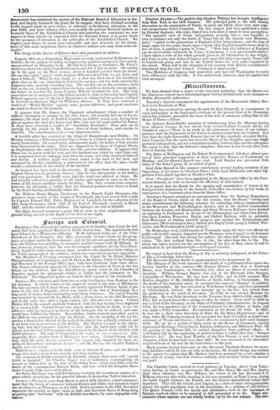goreign ant( Qiolonial.
ruancE—The Journal des Debuts announced on Sunday., that Count De Sal- 'randy had been appointed Minister of Public Instruction. The appointment had been delayed by a Ministerial difficulty. M. De Salvandy being one of the Vice- Presidents of the Chamber, that office necessarily became vacant by his accep- tance of a place under the Government; and, in the present position of the Cham- bers, the Cabinet was unwilling to encounter another contest with M. Billault. It was, however, arranged that the new Government candidate for the Vice-Presi- dency should be taken from among those members who abstained from voting on the Tahiti paragraph of the address; 'which was expected to prevent opposition.
The Moniteur of Tuesday announced that the Count De St. Priest, Minister Plenipotentiary at Copenhagen and Drouyn De Lhuys, Chief of the Commer- cial Direction of the Foreign Office, have both been dismissed from their offices. The Count vehemently opposed the Cabinet in the Chamber of Peers in the late debate on the address; and the Sub-Director openly voted in the Chamber of Deputies against the paragraph relative to Tahiti and the 'indemnity to Mr. Pritchard. The Opposition pnnts are loud in their censure of the dismissals.
hann.—The over-land mail furnishes us with intelligence from Bombay to the 1st January. It chiefly relates to the sequel of events in the state of Kholapore. The last accounts left Colonel Ovens, the newly-appointed Political Agent, a pri- soner in the fort of Punalla; which was joined to the fort of Pawunghur by a long neck of rocks; both constituting very strong fortresses. The fort of Punalla was invested by General De La Motte, with a strong force, on the 22d November; and on the same day, after a sharp contest, the outworks were taken. Colonel Incites fell in the assault, mortally wounded; both his legs having been sha„ttered by a cannon-ball. Colonel Ovens was urged, under threats of death to use his influence with the besiegers in favour of the besieged: but he refused; and some would have fulfilled the threats. Nevertheless, better counsels prevailed; and on the 29th he was permitted to join his friends. On the morning of the 1st De- cember a breach was effected in the wall of the fort ;it was gallantly stormed, and in an hour was in possession of the British. The Natives escaped to the adjoin- ing fort; but their pursuers followed so close that the barricades could not be closed, and the fort of Pawunghur also remained in the hands of the British, with 2,000 prisoners. The task of dismantling the works at once commenced. Sub- sequently, three smaller forts of Kholapore were taken. Colonel Ovens did not long enjoy his post; he was removed for reasons only surmised by those de- siring to disseminate unfounded charges"; and Mr. Reeves, the original Political Agent, was reinstated. Disturbances continued in the little state of San-unt Warree, and the British troops detached to keep down anarchy had been reinforced.
The sickness in Scinde continued to diminish, though there were still "nearly 3,000 in hospital." Sir Charles Napier was at Larkhana contemplating an assault on Dadur fort, at the foot of the Bolan Pass; which had fallen into the bands of the contumacious Nusseer Khan, and near which the Irregular Horse tinder Captain Taite were cut to pieces.
Sir Henry Hardinge was still at Calcutta, receiving the unanimous praises of a press seldom unanimous, for his peaceful labours in promoting Native education.
Cintia.—The latest news from Macao is dated 25th October; a brief announce- meat that the treaty of commerce between France and China was signed on board the Archimedes, at Whampoa, on the 24th. Fuller accounts to the 19th November represent the country as quiet, trade as dull, and Governor Davis of Hong-kong as getting into " hot water "with the British merchants, by some unpopular ordi- nances.
UNITED Srerss.—The packet-ship Stephen Whitney has brought intelligence from New York to the 14th January. The principal point is dw still waxing discussion on the annexation of Texas; to carry out which there were nine sepa- rate propositions before Congress. On this subject had been published a letter by General Jackson; who says, that if it is to be done it must be done promptly- " The splendid view of Texas independent, growing into a vast republic, in time to embrace not only the limits of Texas but all the domain once Montezu- ma's," "added to the guarantees of England of her independence, and the loan of large sums for ten years, based upon a treaty that English manufactures shall be free of duty, is gaining a party in Texas." "How long this influence of England can be successfully withstood in Texas, is becoming a very questionable matter. I have taken a view of the whole ground, given to all information its due weight; and I say to you, that unless Congress acts upon this subject promptly, Texas will be beyond our grasp and lost to the United States for ever, unless regained by the sword. What will be the situation of our country with British manufactures introduced duty-free into Texas ? Comment is unnecessary."
Two Members of Congress had quarrelled, and had left Washington to settle their differences with the rifle. It was understood, however, that the matter had been arranged.


























 Previous page
Previous page